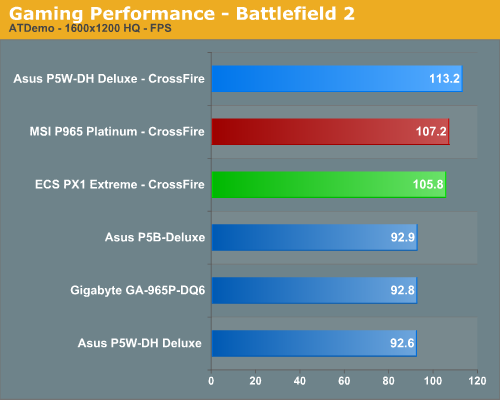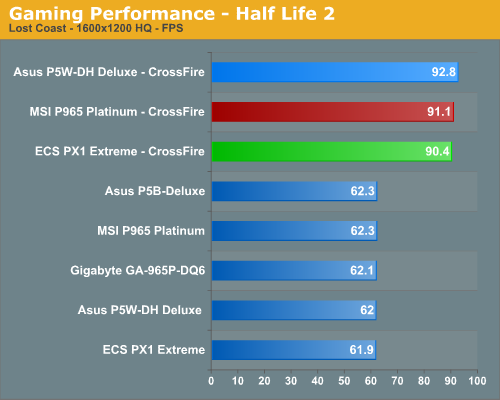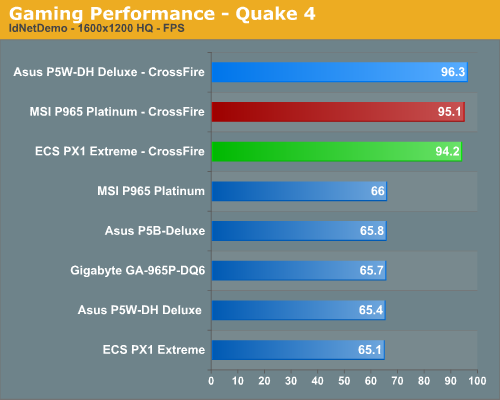Intel P965: MSI P965 Platinum and ECS PX1 Extreme
by Gary Key on December 6, 2006 4:30 AM EST- Posted in
- Motherboards
Gaming Performance - CrossFire



CrossFire Gaming Summary
We utilized the final 6.10 driver set for testing. We also tested with the recently released 6.11 driver set but did not note any significant differences in performance or compatibility on our two boards today. AMD/ATI has made significant improvements in the performance of CrossFire on the P965 chipset but the 975X still performs better overall across a wide variety of games. In fact, in Company of Heroes the P965 suffers a performance impact of up to 50% when compared to the 975X chipset. We are still testing other games but at this time we still recommend the 975X chipset for the best CrossFire performance and compatibility across a wide range of titles. Our MSI P965 Platinum continues to lead the ECS PX1 in our test applications. Although the scores do not show it, we noticed certain stutters during CrossFire operation with the ECS PX1 that were very noticeable in Battlefield 2. The latest BIOS from ECS just implemented CrossFire compatibility so we believe ECS still has some fine tuning to accomplish. We will present additional CrossFire results in our next review.



CrossFire Gaming Summary
We utilized the final 6.10 driver set for testing. We also tested with the recently released 6.11 driver set but did not note any significant differences in performance or compatibility on our two boards today. AMD/ATI has made significant improvements in the performance of CrossFire on the P965 chipset but the 975X still performs better overall across a wide variety of games. In fact, in Company of Heroes the P965 suffers a performance impact of up to 50% when compared to the 975X chipset. We are still testing other games but at this time we still recommend the 975X chipset for the best CrossFire performance and compatibility across a wide range of titles. Our MSI P965 Platinum continues to lead the ECS PX1 in our test applications. Although the scores do not show it, we noticed certain stutters during CrossFire operation with the ECS PX1 that were very noticeable in Battlefield 2. The latest BIOS from ECS just implemented CrossFire compatibility so we believe ECS still has some fine tuning to accomplish. We will present additional CrossFire results in our next review.










13 Comments
View All Comments
mostlyprudent - Wednesday, December 6, 2006 - link
I had been looking forward to the review of the MSI board. I can understand some OC limitation at the price, but then don't call it a "Platinum" board. I really don't do very much OCing, but always view the ability to reach high overclocks as a sign of a more well engineered board.Anyway, thanks for the review.
Beachspree - Monday, December 11, 2006 - link
I was wondering why the Firewire performance is so poor in these reviews:Firewire 400 gets a best throughput of 230.6Mb/s
It is known that Macs have poor USB 2 performance but look at the Firewire results by Barefeats:
http://www.barefeats.com/usb2.html">http://www.barefeats.com/usb2.html
http://www.barefeats.com/hard70.html">http://www.barefeats.com/hard70.html
Without the perfect conditions of a RAM disk and no cacheing they get real world performance of up to:
Firewire 400: 304 Mb/s (31% faster)
Firewire 800: 464 Mb/s (41% faster)
For comparison, Macs are getting lousy USB 2 performance. Intel Macs have improved it but that takes it from around 136Mb/s to 168Mb/s. That's 75% slower.
Given the importance of Firewire in critical multimedia applications and it's likely use for HD video camcorders does this poor performance not warrant a mention?
Beachspree - Monday, December 11, 2006 - link
To be clearer:Can we please have some real world figures for USB 2.0, eSATA and Firewire 400/800 transfers?
That should take the form of transfers of:
a) Many small files
b) One large file
under default settings and off an internal 7200 HDD you standardize on. That's what most people actually do when the backup, so that's what we need to see in order to make informed choices. I suspect these data rates you keep publishing are ones we will actually never see.
I suggest, also, that poor Firewire performance in Windows is more important than poor USB on Macs. They always have Firewire built in and tend to it on peripherals, while Windows users often make do with USB until they get into music or video editing when they then find the need for Firewire and hit this poor performance just when they start needing mission critical performance. I'm talking about dropped frames and music latency.
Why is that ignored in all your motherboard reviews?
Thanks.